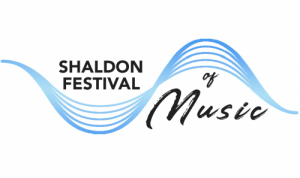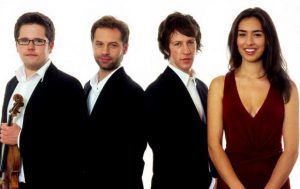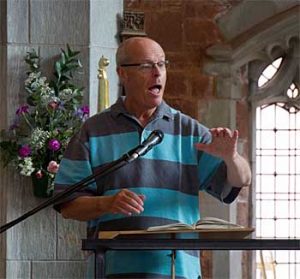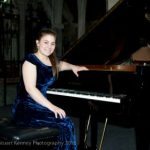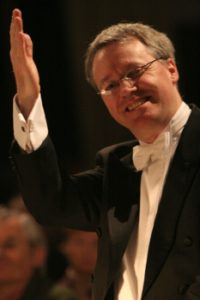Shaldon Festival 2010
Click on the past performances to jump to the information or scroll down the page.
Choral Workshop and Informal Concert 2010 directed by Brian Kay
Royal College of Music Junior Department
Solstice String Quartet
Concert
Sunday 20 June 2010
SOLSTICE STRING QUARTET
Jamie Campbell – First Violin
Helena Nicholls – Second Violin
Meghan Cassidy – Viola
Gregor Riddell – Cello
With Timothy Orpen – Clarinet
Concert sponsored by the Royal Over-Seas League
Programme:
Haydn String Quartet Op 64 No 6
Janácek String Quartet No 2 “Intimate Letters”
Mozart Clarinet Quintet
Detail:
The final concert of the 2010 Shaldon Festival maintained the excellent standard set over the three previous evenings. The young Solstice String Quartet were first prize winners in the prestigious 2009 Royal Over-Seas League Music Competition and we are most grateful to ROSL for financially supporting this concert. It was an honour to welcome Roderick Lakin, Director of Arts for the Royal Over-Seas League, who gave an introductory talk with a short history of the ROSL. It is a Commonwealth membership organization founded in 1910 to foster international understanding and friendship, and unlike other clubs at that time it offered women equal membership status to men. Today ROSL is a not-for-profit club, handily placed behind the Ritz Hotel in London, and the organizer of arts and educational projects.
It was fitting to follow Haydn’s Creation from the previous evening with his String Quartet in E Flat Major, Op.64 No.6; both works stemming from Haydn’s visit to London in 1791. The Opus 64 quartets received their first performance in June that year in the Festino Room in Hanover Square. The wit, sparkle and humour of this piece were all infectiously conveyed by the Solstice String Quartet in this performance; they were technically superb with a well balanced sound.
In the second piece, String Quartet No.2 “Intimate Letters”, the players captured the intensity and passion of this work, composed by Leoš Janá?ek in the last year of his life. Janá?ek’s unreciprocated passion for a much younger woman, Kamila Stösslová inspired him to express in music the kind of emotional turmoil usually expressed in words. Full of harmonic and rhythmic twists and turns, the Solstice String Quartet conveyed the different emotions well e.g. red-blooded passion, quiet contemplation, jealous anger, without losing the overall continuity of the music.
The clarinet player Timothy Orpen joined the Solstice String Quartet for the eagerly anticipated final work of the concert, Mozart’s Clarinet Quintet. To re-capture the authenticity of the work, Timothy Orpen had commissioned a clarinet maker to provide him with a basset clarinet; a standard clarinet but longer with additional keys to be able to play several lower notes. He explained to the audience that Anton Stadler, Mozart’s fellow Mason and gambling partner, had created his own basset clarinet for the first performance. The original manuscript has long disappeared, (probably stolen by Stadler) and subsequent scores were noted for the standard Eb clarinet so it is quite difficult to work out which notes should be played at the lower pitch.
The opening Allegro was played with feeling and empathy, leading into the Larghetto which is the heart of the work bringing the clarinet more into the limelight. It was a beautifully expressive performance by Timothy Orpen and the string players responded well by blending into the background at some points, but still reminding us of their presence. The dance-like third movement had many in the audience tapping their feet and the final theme and set of five variations provided a perfect platform for the highly skilled playing of these five young musicians.
Enid Hayles
Choral Workshop and Informal Concert 2010 directed by Brian Kay
Choral Workshop
Saturday 19 June 2010
Programme:
Haydn Creation
Directed by BRIAN KAY
Piano: Peter Adcock
Soprano: Héloïse West
Bass: Julian Rippon
The traditional Saturday choral workshop day was directed by Brian Kay, the well known TV and Radio broadcaster, choral conductor and the original bass voice in the King’s Singers. It was his first visit to Shaldon Festival and we very much hope not his last. The 200 singers who had enrolled for the day witnessed a consummate choral master at work. Dividing Parts I, II and III of Hadyn’s Creation evenly across the morning and two afternoon sessions, and interspersed with many entertaining anecdotes, he achieved a miraculous transformation in the sound of the choir. The singers, almost effortlessly, absorbed the technique he was demonstrating for resonant voice production and conveying the meaning of the words.
The singers were joined by a good sized audience in the evening for an informal performance of the work which was thoroughly enjoyed by all. The soprano soloist Héloïse West sang beautifully; delightful ornamentation with the ‘cooing dove’ in her Part II Aria and her bel canto voice soaring above the chorus in Part III. Bass soloist Julian Rippon was also in fine form with an intelligent and sympathetic performance. Unfortunately the tenor soloist engaged for the day took ill at the last moment and high praise goes to Héloïse and Julian who with the assistance of our superb accompanist Peter Adcock happily divided the part between them. When they were otherwise occupied with their own parts, Brian Kay sang the tenor line whilst continuing to conduct, a remarkable example of multi-tasking. In the words of the text “Achieved is the glorious work”.
Enid Hayles
Royal College of Music Junior Department
Concert
Friday 18 June 2010
Programme:
Rebecca Baker Violin Seriozha Tugarinov Violin
Daniel Keen Viola Harry Gilfillan Cello
String Quartet op 18 No 1 (First movement Allegro con brio) LUDWIG VAN BEETHOVEN
Divertimento in F K158 (First movement Allegro) WOLFGANG AMADEUS MOZART
String Quartet (First movement Allegro moderato) MAURICE RAVEL
Finlay Bain Horn accompanied by Susie Summers
Notturno FRANZ STRAUSS
Hunter’s Moon GILBERT VINTER
Lara Ömeroglu Piano
Etude Op. 25 No. 7 FREDERIC CHOPIN
Concert Etude No. 3 “Un Sospiro” FRANZ LISZT
Suite De Danzas Criollas ALBERTO GINASTERA
Katy Smith Violin accompanied by Susie Summers
Sonata no 2 in A op 100 (First movement Allegro amabile) JOHANNES BRAHMS
Rhapsody no 1 BELA BARTOK
Friday’s concert, given by young musicians who attend the Saturday Morning Junior Department of the Royal College of Music, was a triumph and will go down in the Shaldon Festival annals as probably the best concert ever given in St Peter’s Church by aspiring young classical musicians. It was introduced by their Director, Peter Hewitt, who had kindly agreed to take time out of his busy schedule to visit the Festival.
First on the platform was a very young string quartet ably led by 14 year old Rebecca Baker on first violin with Seriozha Tugarinov (13) on second violin, Daniel Keen (12) on viola and Harry Gilfillan (13) on cello. They opened with the first movement of Beethoven’s String Quartet Op.18 No.1 and it was clear they were already showing a very good sense of ensemble playing with a strong sound and nimbly executed faster passages. They made a creditable effort with the varying textures of the first movement of Ravel’s String Quartet and finished with a great sense of style and phrasing in the first movement of Mozart’s Divertimento in F.
This was followed by Finlay Bain, a young horn player, who was a brass finalist in the 2010 BBC Young Musician of the Year and has won a foundation scholarship to study at the Royal College of Music from September 2010. In his first piece Notturno by Franz Strauss Finlay ably demonstrated the rich tone and beauty of the horn sound with lyrical and sustained lines and a deep sonorous final note. His second piece Hunter’s Moon by Gilbert Vinter has a local connection as it was composed whilst Vinter was on RAF aircrew training in Torquay during World War II. It is an entertaining recital piece which allowed Finlay to display a wide range of horn technique. His performance was further enhanced by the very fine piano accompaniment of Susie Summers, who is a Junior Fellow at the Royal College of Music.
After the interval it was the turn of 18 year old violinist Katy Smith accompanied once again by Susie Summers. The two have performed regularly together over the past year including the string category finals of the 2010 BBC Young Musician of the Year. Playing on a very fine 18th century English violin, from the very first notes of the first movement of Brahms Sonata No 2 in A Katy captured the audience’s attention with the brilliance of her playing conveying the sheer lyric beauty of this movement. The dramatic Rhapsody No. 1 by Béla Bartók with its Romanian folk music references was a good choice to follow the Brahms, played with great authority and technical mastery.
Last but not least it was the turn of 16 year old pianist Lara Melda (Ömeroglu) fresh from her triumph of winning the coveted title of 2010 BBC Young Musician of the Year. The near capacity audience in St Peter’s was thrilled with her playing. The opening Chopin Etude Op.25 No.7 demonstrated so well her sense of musical shape and understanding of the music. The Franz Liszt Concert Etude No.3 Un Sospiro was a good showpiece for her technical ability and the concluding Suite De Danzas Criollas by Alberto Ginastera encapsulated her sense of rhythm, power and sheer exuberance. In his opening remarks Peter Hewitt had mentioned the interesting link that Lara’s teacher Emily Jeffery had been taught by David Parkhouse in whose memory Shaldon Festival had been founded. Lara received a standing ovation; a fitting end to an exceptional evening.
Enid Hayles
Bath Philharmonia
Concert
Thursday 17 June 2010
BATH PHILHARMONIA
Conductor: Jason Thornton
Piano: Marina Nadiradze
Barber Adagio
Gershwin Three Preludes
Gershwin Rhapsody in Blue
Ives Unanswered Question
Copland Appalachian Spring
Tickets for the opening concert of the 2010 Festival were already sold out before the day and it proved to be a hugely entertaining evening. Bath Philharmonia under their Music Director Jason Thornton presented an imaginative and challenging all American programme.
Starting quietly with Samuel Barber’s Adagio, the programme sprang into life with the performance by Marina Nadiradze of George Gerswhin’s Three Preludes for Piano. This young international pianist from Georgia captured the spirit of the pieces brilliantly: the strong jazz feel of the first, blues lullaby of the second and highly syncopated third prelude. Her technical mastery, sense of dynamics and great feeling for Gershwin’s writing was thrilling. She returned to the platform with the orchestra to give a performance of Gershwin’s Rhapsody in Blue in the original jazz-orchestration arrangement. As Jason explained to the audience, there were some minor divergences: they did not have a banjo, one of the clarinets doubled up as an oboe and the double bass doubled up as a sousaphone. Nevertheless, this iconic piece which saw the fusion of classical and modern day jazz (the pop genre of its time) was given a spirited rendering. Marina played the piano part with great panache and verve, as did the clarinets, trumpets and trombones. It was clear the musicians were enjoying themselves, particularly the four violins who were providing the modern day equivalent of a pop backing group.
After the fireworks of the first half, Charles Ives The Unanswered Question was a perfect antidote to start the second half. The strings, playing pianississimo throughout with no change of tempo, brought a mystical feel to the piece whist the trumpet (played from the choir stalls) intoned the ‘Question’ of Existence answered by the woodwind (played from the west end of the church) who became more active, faster and louder as the piece progressed. For many in the audience this was the first time they had heard the piece; it certainly generated some discussion!
The concert finished with Aaron Copland’s Appalachian Spring, not the subsequent orchestral arrangement but the original version played by the pit band for the ballet premiered in 1944. The strings of the Bath Phil had a chance to shine as they gave a polished and well crafted performance of this popular work. As an encore they reprised the hymn tune Simple Gifts which forms the climax of the work. Jason had been conducting a six day schools workshop during the Festival week and he dedicated the encore to Roger Kirk of the Helen Foundation and the Shaldon Festival committee members who had organized the event and enabled the gift of music to be brought to local children including those with special needs.
Enid Hayles
